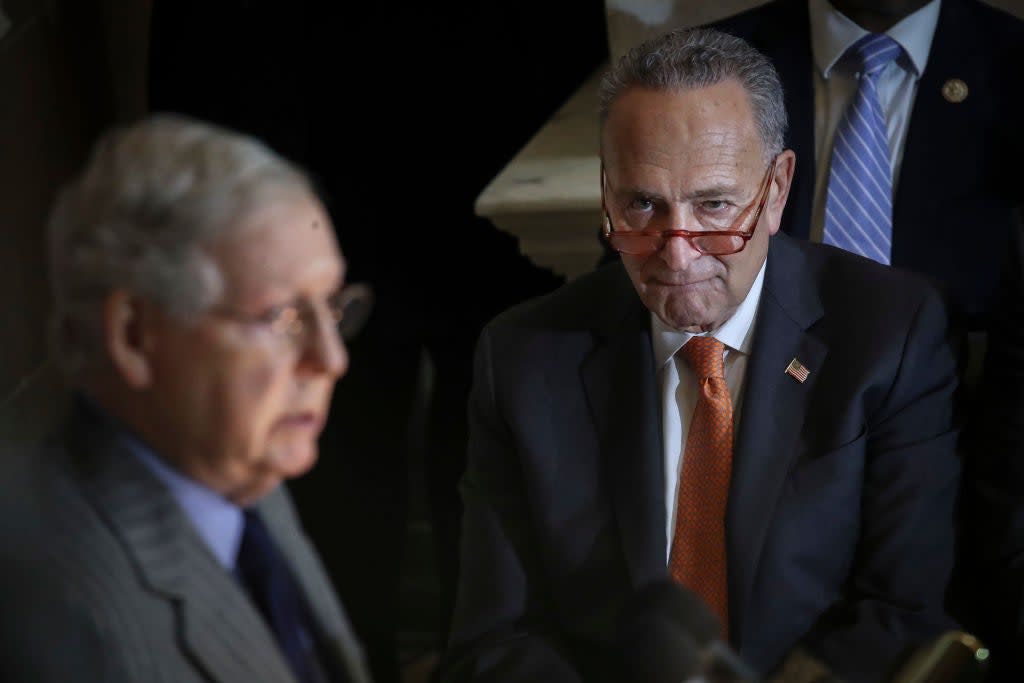Covid relief: McConnell and Schumer can’t even agree on whether negotiations have actually resumed

- Oops!Something went wrong.Please try again later.
- Oops!Something went wrong.Please try again later.
For a brief moment on Thursday, lawmakers in Washington finally appeared to have begun making progress on cobbling together a sweeping rescue package for American businesses, hospitals, and people struggling through the Covid-19 pandemic.
It turned out to be fool’s gold.
Earlier on Thursday, Senate Minority Leader Chuck Schumer told reporters at a New York press conference that Majority Leader Mitch McConnell had agreed to rejoin Democrats and Trump administration officials at the negotiating table after months of spurning talks on a new Covid deal.
“Last night, they’ve agreed to sit down, and the staffs are going to sit down today or tomorrow to try to begin to see if we can get a real good Covid relief bill,” the New York Democrat said of his GOP counterpart from Kentucky.
“So there’s been a little bit of a breakthrough in that McConnell’s folks are finally sitting down and talking to us,” Mr Schumer said.
But Mr McConnell’s team did not confirm Mr Schumer’s characterisation of the two sides’ engagement on Covid relief, and it remains unclear toThe Independent what stage those talks are in — if they have even commenced at all.
In a meeting on Wednesday night, the two leaders discussed, separately, a potential Covid relief package as well as a legislative package to fund the federal government, a senior Democratic aide told The Independent.
“Democrats look forward to continuing those talks,” the aide said.
But the aide did not immediately respond to a follow-up request to clarify if Mr Schumer’s and Mr McConnell’s teams were actually sitting down together for actual negotiations on Covid relief.
That neither camp could even agree on whether formal negotiations had begun on Covid shows just how far apart they remain on an eventual deal, as millions of Americans are poised to lose their unemployment benefits and rent and mortgage coverages by year’s end.
The daily number of new people testing positive for Covid-19 in the US has continued to hover well above 150,000, as deaths remain steady at around 1,500 per day. Small business owners — especially those who own restaurants — have been fretting the winter months, when the outdoor seating that has helped them make it through the warmer months, will not be an option.
Both parties know they must take action, and soon.
Yet they have been at loggerheads since the spring about how to approach a follow-up coronavirus relief package to the $2.2trn CARES Act signed into law in March. Congress subsequently replenished a key small business relief initiative from the CARES Act, the Paycheck Protection Program (PPP), with an additional $484bn in April and has tweaked the parameters of that programme.
But a comprehensive follow-up package has eluded bipartisan agreement, with both parties passing (or trying to pass) their own legislation that has stood no chance of being signed into law and then pointing the finger at the opposition for obstructing progress.
In May, House Democrats passed a bill worth an estimated $3trn that would have extended a new $600-per-week federal unemployment benefit, shovelled more money to states and local governments on the frontlines of the pandemic, rolled out a comprehensive testing and contact tracing strategy, and invested billions of dollars in broadband internet infrastructure for a country whose workers and children have been working or attending school from their homes at an unprecedented level.
The Democrats reduced their asking price to $2.2trn in the fall, but that was still too exorbitant for Senate Republicans who had rediscovered their aversion to government spending.
Mr McConnell has called the various iterations of the Democrats’ proposal a “multi-trillion-dollar laughing stock” and a “liberal wish list” and said they’ve “never had a chance of becoming law.”
Publicly, the majority leader has proposed a piecemeal legislative process where the parties can come together for discussions on “all the areas where compromise is well within reach” to bolster “uncontroversial programmes” like PPP, a fund for distributing vaccines that are nearing the final stages of development, and eviction moratoriums.
“Let Washington argue over the rest later,” Mr McConnell said on the Senate floor earlier this week.
That hasn’t flown with Democrats, who have been burned by such a legislative approach before. Case in point: it has taken Mr McConnell seven months to return to official negotiations for a follow-up package to the CARES Act.
This time around, Mr Schumer and Speaker Nancy Pelosi have insisted that any major legislation must be a comprehensive package so they do not relinquish their negotiating leverage and let Republicans simply walk away once more.
President-elect Joe Biden has urged Congress to pass the Democrats’ latest $2.2trn offer, signalling his hope that once Mr Trump has left the White House in January Republicans will “be more willing to do what they know should be done — has to be done — in order to save the communities they live in.”
That’s wishful thinking so long as Mr McConnell is the majority leader.
The Kentucky Republican has been advocating for Democrats to hop on board his $500bn “targeted” relief bill that includes liability protections for schools, health systems, and small businesses, a demand to which Democrats are extremely resistant.
No signs have emerged that either party might budge anytime soon.
Read More
McConnell rebukes Trump’s Afghan withdrawal, warning of renewed terror
The Latest: Pelosi, Schumer going to Delaware to see Biden
Pelosi slams Trump for ‘undermining democracy’ by firing Chris Krebs
McCarthy: GOP will ‘accept’ 2020 election results even if Trump loses
Trump announces ‘path to victory’ press conference – follow live

